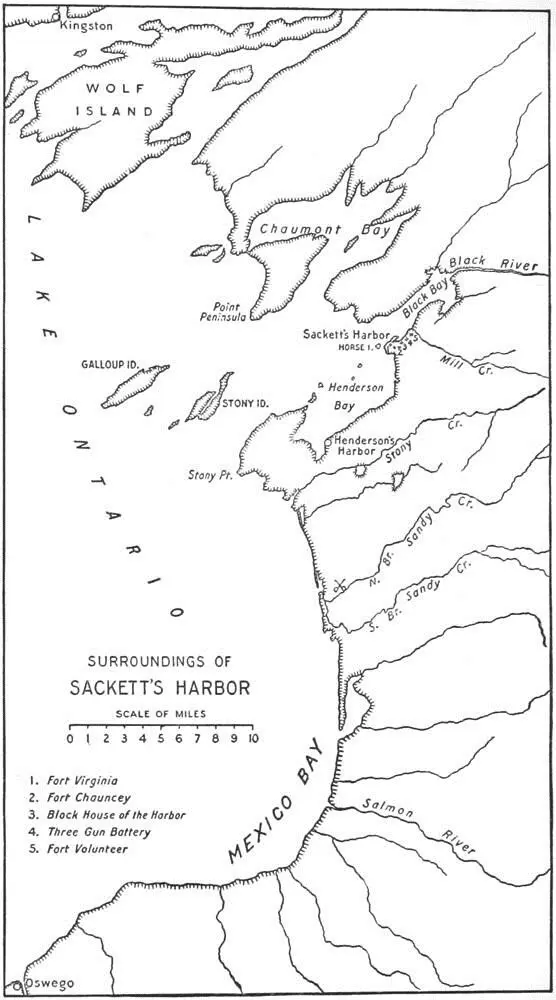Alfred Thayer Mahan - Sea Power in its Relations to the War of 1812. Volume 2
Здесь есть возможность читать онлайн «Alfred Thayer Mahan - Sea Power in its Relations to the War of 1812. Volume 2» — ознакомительный отрывок электронной книги совершенно бесплатно, а после прочтения отрывка купить полную версию. В некоторых случаях можно слушать аудио, скачать через торрент в формате fb2 и присутствует краткое содержание. Жанр: foreign_prose, История, foreign_edu, foreign_antique, на английском языке. Описание произведения, (предисловие) а так же отзывы посетителей доступны на портале библиотеки ЛибКат.
- Название:Sea Power in its Relations to the War of 1812. Volume 2
- Автор:
- Жанр:
- Год:неизвестен
- ISBN:нет данных
- Рейтинг книги:5 / 5. Голосов: 1
-
Избранное:Добавить в избранное
- Отзывы:
-
Ваша оценка:
- 100
- 1
- 2
- 3
- 4
- 5
Sea Power in its Relations to the War of 1812. Volume 2: краткое содержание, описание и аннотация
Предлагаем к чтению аннотацию, описание, краткое содержание или предисловие (зависит от того, что написал сам автор книги «Sea Power in its Relations to the War of 1812. Volume 2»). Если вы не нашли необходимую информацию о книге — напишите в комментариях, мы постараемся отыскать её.
Sea Power in its Relations to the War of 1812. Volume 2 — читать онлайн ознакомительный отрывок
Ниже представлен текст книги, разбитый по страницам. Система сохранения места последней прочитанной страницы, позволяет с удобством читать онлайн бесплатно книгу «Sea Power in its Relations to the War of 1812. Volume 2», без необходимости каждый раз заново искать на чём Вы остановились. Поставьте закладку, и сможете в любой момент перейти на страницу, на которой закончили чтение.
Интервал:
Закладка:

SURROUNDINGS OF SACKETT'S HARBOR
The British landed upon Horse Island soon after daylight of May 29, and from there advanced. The militia met them with a volley, but then broke and fled, as had been foreseen by Brown, himself yet a militia officer. Their colonel behaved gallantly, and was killed in trying to rally his men; while Brown in person, collecting a hundred of the fugitives, worked round with them to the left flank of the approaching British. These, moving through the woods, now encountered Backus and his regulars, who made upon them an impression of overwhelming numbers, to which the British official report bears a vivid testimony. The failure to carry the place is laid by this paper upon the light and adverse winds, which prevented the co-operation of the squadron's heavy guns, to reduce the batteries and blockhouse. Without this assistance, it was impracticable to carry by assault the works in which the Americans had taken refuge. The gunboats alone could get within range, and their small carronades were totally inadequate to make any impression on the forts and blockhouses. "The troops were reluctantly ordered to leave a beaten enemy." Brown makes no mention of this retreat into the works, though it appears clear that the Americans fell gradually back to their support; but he justifies Prevost's withdrawal, bitterly criticised by writers of his own nation, in the words, "Had not General Prevost retreated most rapidly under the guns of his vessels, he would never have returned to Kingston." 58 58 Brown's and Prevost's Reports of this affair may be found in Niles' Register, vol. iv. pp. 260, 261. That of Yeo is in the Canadian Archives; M. 389, 6, p. 22.
In the midst of the action word was brought to Lieutenant Chauncey that the battle was lost, and that the yard must be fired. Brown, in his official report, expressly acquitted him of blame, with words of personal commendation. The two schooners in commission had retreated up Black River; but the prize "Duke of Gloucester," and the ship approaching completion, were fired. Fortunately, the flames were extinguished before serious damage was done; but when Commodore Chauncey returned on June 1, he found that among a large quantity of materials consumed were the stores and sails of the new ship. The loss of these he thought would delay the movements of the squadron three weeks; for without her Yeo's force was now superior. 59 59 Captains' Letters, June 11, 1813.
The defence of Sackett's Harbor obtained immediately for Brown, who was just thirty-eight, the commission of brigadier general in the army; for the new Secretary, Armstrong, was looking round anxiously for men to put in command, and was quick to seize upon one when he found him. To Chauncey, on the other hand, the affair in its consequences and demonstration of actualities was a rude awakening, to which his correspondence during the succeeding six weeks bears witness by an evident waning of confidence, not before to be noted. On June 4 he tells the Secretary of the Navy that he has on Ontario, exclusive of the new ship not yet ready, fourteen vessels of every description, mounting sixty-two guns; whereas Yeo has seven, which, with six gunboats, carry one hundred and six. "If he leave Kingston, I shall meet him. The result may be doubtful, but worth the trial." This resolution is not maintained. June 11 he hears, with truth, that Yeo was seen at the head of the lake on the 7th, and that the Americans at Fort George had taken his squadron to be Chauncey's. By the same channel he learns of a disastrous engagement of the army there, which was likewise true. His impulse is to go out to meet the British squadron; but he reflects that the enemy may then again find an opportunity to descend upon Sackett's, and perhaps succeed in burning the new ship. Her size and armament will, he thinks, give him the decisive superiority. He therefore resolves to put nothing to hazard till she is finished. 60 60 Captains' Letters.
The impression produced by the late attack is obvious, and this decision was probably correct; but Yeo too is building, and meantime he has possession of the lake. On June 3 he left Kingston with a squadron, two ships and four schooners, carrying some three hundred troops for Vincent. On the evening of the 7th, about six o'clock, he was sighted by the American army, which was then at Forty Mile Creek on the Ontario shore; a position to which it had retired after a severe reverse inflicted by the enemy thirty-six hours before. Vincent's retreat had been followed as far as Stony Creek, ten miles west of Forty Mile Creek, and somewhat less distant from Burlington Heights, where the British lay. The situation of the latter was extremely perilous; for, though strongly placed, they were greatly outnumbered. In case of being driven from their lines, they must retreat on York by a long and difficult road; and upon the same poor communications they were dependent for supplies, unless their squadron kept control of the lake. Recognizing that desperate conditions call for desperate remedies, Vincent resolved to risk an attack with seven hundred men under Colonel Harvey, in whose suggestion the movement originated. These fell upon the American advance corps at two o'clock in the morning of June 6. An hour of fighting ensued, with severe loss on both sides; then Harvey, considering sufficient effect produced, drew off his men before daylight revealed the smallness of their numbers.
There was in this affair nothing intrinsically decisive, scarcely more than a business of outposts; but by a singular coincidence both American generals present were captured in the confusion. The officer who succeeded to the command, a colonel of cavalry, modestly distrustful of his own powers, could think of nothing more proper than to return to Forty Mile Creek, sending word to Fort George. Dearborn, still too weak to go to the front, despatched thither General Morgan Lewis. On his way Lewis was overtaken by two brief messages from the commander-in-chief announcing the appearance of Yeo's fleet, and indicating apprehension that by means of it Vincent might come upon Fort George before the main army could fall back there. It was most improbable that the British general, with the command of the lake in doubt would thus place himself again in the position from which he had with difficulty escaped ten days before; but Dearborn's fears for the safety of the forts prevailed, and he ordered a retreat. The movement began by noon of June 8, and in a few days the army was back at Niagara River, having lost or abandoned a quantity of stores. The British followed to within ten miles of the fort, where they took up a position. They also reoccupied Beaver Dam; and a force of six hundred Americans sent to dislodge them, under Colonel Boerstler, was compelled to surrender on June 24. 61 61 The account of these transactions is summarized from American State Papers, Military Affairs, vol. i. pp. 445-449. For Vincent's report of the Stony Creek affair see Cruikshank's Documentary History of the Campaign on the Niagara Frontier, 1813, Part II, p. 8.
Dearborn, who had already reported to the Department that he personally was "so reduced in strength as to be incapable of any command," attributed his embarrassments "to the temporary loss of command of the lake. The enemy has availed himself of the advantage and forwarded re-enforcements and supplies." The effect of controlling the water cannot be contested; but the conditions at Stony Creek were such that it should have been possible to drive Vincent away from any hold on the south shore of Ontario. Creditable as had been the enterprise of Colonel Harvey, it had accomplished no change in material conditions. Dearborn was soon afterward relieved. His officers, including Scott, joined in a letter of regret and esteem, prompted doubtless by sympathy for the sufferings and miscarriage of an aged officer who had served gallantly in his youth during the War of Independence.
Интервал:
Закладка:
Похожие книги на «Sea Power in its Relations to the War of 1812. Volume 2»
Представляем Вашему вниманию похожие книги на «Sea Power in its Relations to the War of 1812. Volume 2» списком для выбора. Мы отобрали схожую по названию и смыслу литературу в надежде предоставить читателям больше вариантов отыскать новые, интересные, ещё непрочитанные произведения.
Обсуждение, отзывы о книге «Sea Power in its Relations to the War of 1812. Volume 2» и просто собственные мнения читателей. Оставьте ваши комментарии, напишите, что Вы думаете о произведении, его смысле или главных героях. Укажите что конкретно понравилось, а что нет, и почему Вы так считаете.












